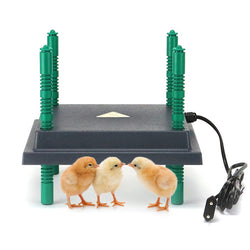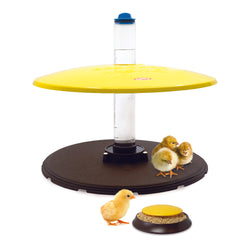Do chickens have a language?
Back to blog
In many ways they do. Chickens can make a very wide range of sounds, and they communicate amongst each other well.
Roosters can sing loudly when they crow--they also issue predator warnings. Interestingly, they have different "words" for a predator that is coming on the ground, compared with a predator that is coming from above, like a hawk. They can call their girls over whenever they find a tasty treat by using a specific vocalization that the hens recognize. Hens make a similar clucky calling sound when they are teaching their babies what is good to eat and what is not.

Cute, huh? Hens will repeatedly pick up and drop yummy little tidbits in front of their chicks to demonstrate what is good to eat. It's the chicken version of the amazing Italian mama who says to everyone, "Eat, EAT!" In tests, hens can even teach their babies to stay away from color coded grains that are bad for them. Hens can also make a purring sound, and may do this when they are hatching eggs--the little chicks inside can hear her so they can recognize her voice after they hatch. Chicks begin peeping even inside their eggs, so that mama can feel and hear them, too. So, chickens actually begin communicating before they have even hatched.
Different breeds have different voices. Faverolles have a distinctive, pretty warble, and tend to be chatty. Rhode Island Reds say very little except when they have just laid an egg. Silkies have distinct voices. At times when they're nervous, it can almost sound as if they're laughing. These are just a few examples.
Other sounds that chickens produce include the "cackle" hens make after they have laid an egg. A broody or dominant hen can issue warning to others to stay away. Here is a broody silkie named Matilda, with her wings protectively around the chicks she is raising. She will let other hens know if they're getting too close!

Free ranging flocks of chickens mutter quietly simply to be companionable with one another; they are flock animals, and the soft, back-and-forth chatter lets them know they are close enough to everyone to receive any important communications that will help keep them safe (and also they will hear if their rooster locates something tasty they might be interested in eating). All chickens will squawk when they are disturbed or hurt: for instance, hens in battery farms sometimes moan all day in misery and from excessive stress.
My chickens even let me know when they have knocked their waterer or a feeder over: I can recognize the tone in their ba-gawking when they are complaining about something wrong in the coop, and I can distinguish that from the "I laid an egg" song. My rooster has even called me over to his side to retrieve bits of broken glass someone has scratched up somehow, while at the same time driving off any hens that came to investigate his calls, as if he somehow knew that it was not supposed to be there. I knew he was calling for me when the "COME HERE" got more and more insistent, and when I saw that he was driving the hens away, very unlike him. When I started to walk toward him to see what was up, he redoubled his efforts to get me interested in what he had to show me. Good boy! Bits of broken glass would not be good for the hens, but I wonder how he knew that? Perhaps it was a coincidence, but if so, it was a very lucky one.
If you try to pay attention to what your chickens are doing when they make their vocalizations, you may be able to begin deciphering their language. Recently, for example, I was listening to a program on NPR in which they played a humorous "chicken song" where one human made chicken noises while another sang. Something about the song bothered me, though--it sounded so unnatural! I couldn't figure out at first what it was until I began to listen closely to the alleged "chicken noises" in the song. Then it struck me: whoever was making the noises was clearly unfamiliar with chickens. In fact, that person was speaking chicken gibberish! All the noises were chicken-y, certainly, but strung together in the order they were, they were completely random and made no sense at all.
As I listened to the Chickenese, it sounded like he was saying "OH NO, A HAWK--well, this looks tasty--OUCH, STOP PECKING ME--yum yum yum yum yum--I'M THE BIGGEST ROOSTER THAT YOU'VE EVER--how I love laying in the sun--Girls, I've got a treat for--TIME TO ROOST--get out of my nest because I'm going to lay an--LUCKY ME THERE'S MORE BIRDSEED UNDER THE FEEDER--stop being so uppity, Glenda, I don't think--COME HERE, EVERYBODY, QUICK!" Really, it was dizzying change of subjects all in a row, and to a chicken lady like me, the string of sounds made absolutely no sense. My conclusion is that NPR is definitely better at speaking English than Chickenese. With time and attention, you will also be able to begin understanding Chickenese--and we hope your birds will speak more sense than the chicken monologue in NPR's "chicken song"!
Roosters can sing loudly when they crow--they also issue predator warnings. Interestingly, they have different "words" for a predator that is coming on the ground, compared with a predator that is coming from above, like a hawk. They can call their girls over whenever they find a tasty treat by using a specific vocalization that the hens recognize. Hens make a similar clucky calling sound when they are teaching their babies what is good to eat and what is not.

Cute, huh? Hens will repeatedly pick up and drop yummy little tidbits in front of their chicks to demonstrate what is good to eat. It's the chicken version of the amazing Italian mama who says to everyone, "Eat, EAT!" In tests, hens can even teach their babies to stay away from color coded grains that are bad for them. Hens can also make a purring sound, and may do this when they are hatching eggs--the little chicks inside can hear her so they can recognize her voice after they hatch. Chicks begin peeping even inside their eggs, so that mama can feel and hear them, too. So, chickens actually begin communicating before they have even hatched.
Different breeds have different voices. Faverolles have a distinctive, pretty warble, and tend to be chatty. Rhode Island Reds say very little except when they have just laid an egg. Silkies have distinct voices. At times when they're nervous, it can almost sound as if they're laughing. These are just a few examples.
Other sounds that chickens produce include the "cackle" hens make after they have laid an egg. A broody or dominant hen can issue warning to others to stay away. Here is a broody silkie named Matilda, with her wings protectively around the chicks she is raising. She will let other hens know if they're getting too close!

Free ranging flocks of chickens mutter quietly simply to be companionable with one another; they are flock animals, and the soft, back-and-forth chatter lets them know they are close enough to everyone to receive any important communications that will help keep them safe (and also they will hear if their rooster locates something tasty they might be interested in eating). All chickens will squawk when they are disturbed or hurt: for instance, hens in battery farms sometimes moan all day in misery and from excessive stress.
My chickens even let me know when they have knocked their waterer or a feeder over: I can recognize the tone in their ba-gawking when they are complaining about something wrong in the coop, and I can distinguish that from the "I laid an egg" song. My rooster has even called me over to his side to retrieve bits of broken glass someone has scratched up somehow, while at the same time driving off any hens that came to investigate his calls, as if he somehow knew that it was not supposed to be there. I knew he was calling for me when the "COME HERE" got more and more insistent, and when I saw that he was driving the hens away, very unlike him. When I started to walk toward him to see what was up, he redoubled his efforts to get me interested in what he had to show me. Good boy! Bits of broken glass would not be good for the hens, but I wonder how he knew that? Perhaps it was a coincidence, but if so, it was a very lucky one.
If you try to pay attention to what your chickens are doing when they make their vocalizations, you may be able to begin deciphering their language. Recently, for example, I was listening to a program on NPR in which they played a humorous "chicken song" where one human made chicken noises while another sang. Something about the song bothered me, though--it sounded so unnatural! I couldn't figure out at first what it was until I began to listen closely to the alleged "chicken noises" in the song. Then it struck me: whoever was making the noises was clearly unfamiliar with chickens. In fact, that person was speaking chicken gibberish! All the noises were chicken-y, certainly, but strung together in the order they were, they were completely random and made no sense at all.
As I listened to the Chickenese, it sounded like he was saying "OH NO, A HAWK--well, this looks tasty--OUCH, STOP PECKING ME--yum yum yum yum yum--I'M THE BIGGEST ROOSTER THAT YOU'VE EVER--how I love laying in the sun--Girls, I've got a treat for--TIME TO ROOST--get out of my nest because I'm going to lay an--LUCKY ME THERE'S MORE BIRDSEED UNDER THE FEEDER--stop being so uppity, Glenda, I don't think--COME HERE, EVERYBODY, QUICK!" Really, it was dizzying change of subjects all in a row, and to a chicken lady like me, the string of sounds made absolutely no sense. My conclusion is that NPR is definitely better at speaking English than Chickenese. With time and attention, you will also be able to begin understanding Chickenese--and we hope your birds will speak more sense than the chicken monologue in NPR's "chicken song"!



